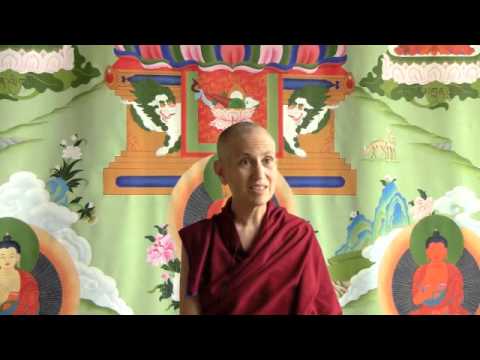The four distortions: Seeing what is impermanent as permanent
A Bodhisattva's Breakfast Corner talk on the Four Truths of the Aryas taught by Shakyamuni Buddha, also known as the Four Noble Truths.
This is a bit of a continuation of the talk that started a few days ago because we took the last several days and did an in-house retreat. That talk began with the idea: “Maybe you think there’s something wrong with your mind by now.” [laughter] Then we spent a day talking about our expectations and how they’re proven false again and again, how we cling to them and how they create so many difficulties in our life. Then over the last two days we were talking about our rules of the universe—how the self-centered thought thinks that the universe should run with us at the center of it.
Today we’re going to go into some deeper levels of misconceptions, some ways in which our mind is wrong. I wanted to talk about the four distortions. I won’t cover all of them today, but we’ll start. This is referring to four distorted ways in which we see objects in cyclic existence.
The four distorted views are: seeing what is foul as beautiful, seeing what is suffering in nature or dukkha in nature as blissful, seeing what is impermanent as permanent, and seeing what has no self as having a self. These four distortions operate in our mind all the time as we relate to things. We constantly think that we’re seeing things as objective entities, that they really are how they appear to us in these four ways. But when we investigate we realize that as usual, we’re wrong. We are especially wrong about the view of impermanence; this is one where we really get tangled up in our grasping at permanence.
We all know things break, and we know people die. We know it intellectually and understand that is a gross level of impermanence. But ordinarily, we don’t even think about the subtle level of impermanence—how things are arising and ceasing momentarily. Even on the gross level, although we know that things change, when they change we’re always surprised when it’s not a change we’ve expected. We all know we’re going to die, and we all know that the people we care about are going to die. But when somebody dies, we’re so shocked.
We’re shocked even if it’s somebody who’s terminally ill. The day they die there’s still this feeling of “How did they die? That wasn’t supposed to happen.” Or when our cherished possessions fall and break, we’re surprised—even though we know they’re going to break. We know that our treasured car is going to get scratched; we know it’s going to get dented. But when it happens, we think, “How did this happen? This wasn’t supposed to happen.”
So, this is just the gross level of impermanence that we understand intellectually, but on a gut level we’re so out of touch with that, so unfamiliar with that. That’s why the meditation on impermanence and death is so important to get us actively engaged in our meditation practice. Because as long as we have the feeling that we are going to live forever, or that death happens but it happens to other people, or that death will happen to me but later, then when death comes, we’re so shocked. The Buddha has us meditating on death right from the get-go of the practice so that we begin to understand this gross impermanence. And by understanding it, it makes us really cherish the opportunities that we have, and it allows us to take advantage of the opportunities that we have instead of just frittering them away because we think that everything’s always going to be there.
It is important to really make use of our life to practice the Dharma and also to get used to the idea that the people we love and cherish are not always going to be here. That way when they die, we won’t be so totally freaked out. And when death comes our way, we won’t be so shocked that it’s happening. But it requires a lot of meditation just to even get rid of that grossest of obscurations, and to get some gut feeling that: “Yes, I’m going to die,” and “I don’t know when that will happen,” and “At the time I die the only thing that’s important to me is my practice and the karma I’ve created. My body is not important. My friends and relatives aren’t important. My social status isn’t important. My possessions aren’t important.” It requires a lot of work just to get to that level.
This meditation is at the beginning of the lamrim. We’ve been practicing it for years, but it’s really hard really get it into our heads so that it actually makes a change in how we live our lives.
We’ll continue more with permanence and the other distortions in the upcoming days.
Venerable Thubten Chodron
Venerable Chodron emphasizes the practical application of Buddha’s teachings in our daily lives and is especially skilled at explaining them in ways easily understood and practiced by Westerners. She is well known for her warm, humorous, and lucid teachings. She was ordained as a Buddhist nun in 1977 by Kyabje Ling Rinpoche in Dharamsala, India, and in 1986 she received bhikshuni (full) ordination in Taiwan. Read her full bio.


